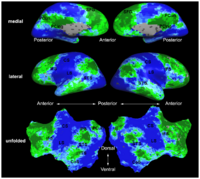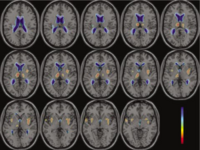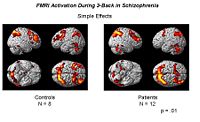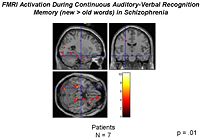Difference between revisions of "NA-MIC Internal Collaborations:fMRIAnalysis"
| Line 13: | Line 13: | ||
In this project we study the application of model-based clustering algorithms in identification of functional connectivity in the brain. [[Projects:fMRIClustering|More...]] | In this project we study the application of model-based clustering algorithms in identification of functional connectivity in the brain. [[Projects:fMRIClustering|More...]] | ||
| − | <font color="red">'''New: '''</font> P. Golland, | + | <font color="red">'''New: '''</font> D. Lashkari and P. Golland, Exploratory fMRI Analysis without Spatial Normalization. Accepted to IPMI: International Conference on Information Processing and Medical Imaging, 2009. |
| + | |||
|- | |- | ||
Revision as of 00:58, 14 May 2009
Home < NA-MIC Internal Collaborations:fMRIAnalysisBack to NA-MIC Internal Collaborations
fMRI Analysis
Functional Activation Analysis

|
fMRI clusteringIn this project we study the application of model-based clustering algorithms in identification of functional connectivity in the brain. More... New: D. Lashkari and P. Golland, Exploratory fMRI Analysis without Spatial Normalization. Accepted to IPMI: International Conference on Information Processing and Medical Imaging, 2009.
|

|
Neural Substrates of ApathyWe recently observed reduced volume of the frontal lobe in patients with schizophrenia having high levels of apathy (link to journal below). In the present investigation we are extending our study of the structural correlates of apathy in schizophrenia using the NAMIC toolkit with an emphasis on basal ganglia. More... New: Feb 22, 2006: Sylvain Bouix to visit Dartmouth. |

|
Neural Substrates of Working Memory in SchizophreniaThis project assesses working memory using an auditory verbal version of the n-back task paradigm. Three conditions are presented in blocks in counterbalanced order with increasing working memory load demands (0-, 1-, 2- and 3-back). More... New: December 20, 2005: Marek Kubicki visit to Dartmouth. |

|
fMRI Detection and AnalysisWe are exploring algorithms for improved fMRI detection and interpretation by incorporting spatial priors and anatomical information to guide the detection. More... New: Wanmei Ou, Sandy Wells, Polina Golland. Bridging Spatial Regularization And Anatomical Priors in fMRI Detection. In preparation for submission to IEEE TMI. |

|
Brain Activation during Continuous Verbal Encoding and Recognition Task in SchizophreniaThis project employs an event-related auditory verbal episodic memory probe targeting medial temporal and DLPFC circuitry. The task uses a continuous performance format where concrete nouns are presented initially as new items. Words are then repeated after short or long intervals and the participant is required to make a new/old distinction. This design permits analysis of both encoding and recognition processes. More... New: December 20, 2005: Marek Kubicki visit to Dartmouth. |

|
Conformal FlatteningThe goal of this project is for better visualizing and computation of neural activity from fMRI brain imagery. Also, with this technique, shapes can be mapped to shperes for shape analysis, registration or other purposes. Our technique is based on conformal mappings which map genus-zero surface: in fmri case cortical or other surfaces, onto a sphere in an angle preserving manner. More... New: Y. Gao, J. Melonakos, and A. Tannenbaum. Conformal Flattening ITK Filter. ISC/NA-MIC Workshop on Open Science at MICCAI 2006. |